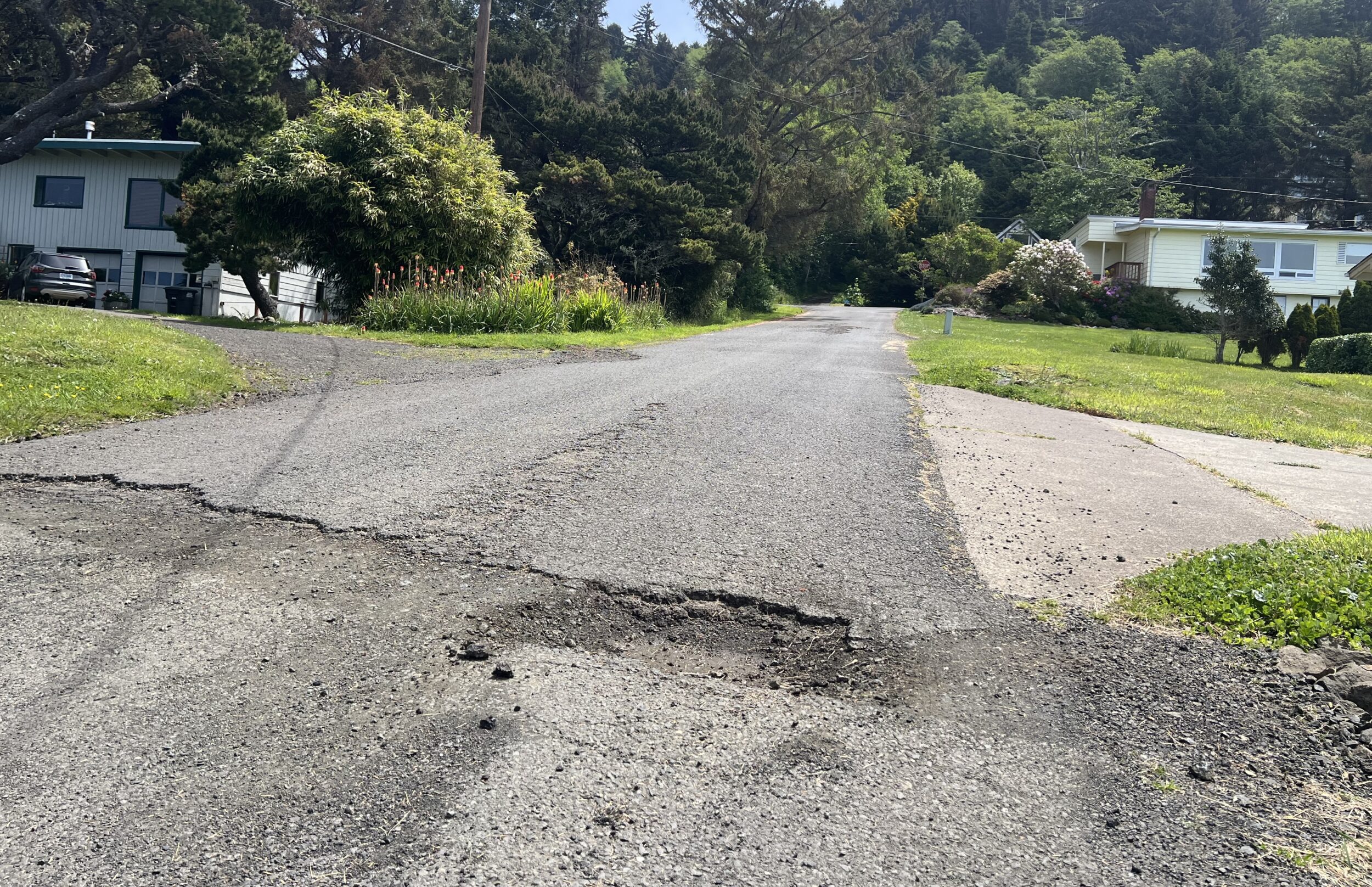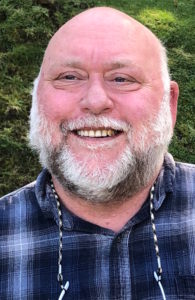
By QUINTON SMITH/Lincoln Chronicle
YACHATS – Will 950 property owners in Yachats go along with a proposal that they pay an extra $10 a month to the city in order to get streets repaired or paved more regularly?
We will see soon.
After getting a recommendation from the Public Works & Streets Commission, talking about it in March and then hearing an hour-long presentation last week, the city council directed city manager Bobbi Price to bring a proposal back to implement the fee to consider – and get feedback – in July or August.
As outlined, the fee would be attached to every water bill in the city – there are 950 meters – and raise an estimated $114,000 a year to be mainly directed to paving, patching, filling potholes, sweeping up gravel and cleaning ditches. Price said some of it could also be used to help pay for large street projects or pay a grant writer to seek outside funds.

Price told the council during a workshop meeting that a survey of residents this year indicated there was support for a fee directed to street repair.
“People are willing to pay an additional fee if we are clear what it’s being used for,” she said.
Because of a myriad of issues, the city has fallen behind on a regular program of basic street repair. It used $200,000 from its capital fund and a $250,000 state grant to rebuild much of East Second Street in 2023. Streets supervisor Rick McClung told the council that the next big capital project is a planned rebuilding of West Third Street in 2026 that could cost $250,000.
But regular paving – overlays of 2- or 3-inches of asphalt – has not been done in years, and the city showing it, Price and McClung said, and residents are complaining about it.

“It’s been a long time since we’ve had a regular street repair program,” McClung said. “I am looking for money that’s dedicated to streets.”
The city has plans to piggyback money in its 2024/25 street repair fund and money in the 2025/26 budget that becomes available July 1 to repair nine streets in late June and early July. But that will basically deplete the street fund until July 2026.
The city has also used added fees before, the last was a $5 monthly fee to help fund sewer improvements that ended in 2020. The proposed city budget for fiscal 2025/26 has only a 1 percent increase in water rates.
The city has been putting $100,000 a year into its street repair budget, but just a few repair projects can eat that up quickly, McClung said. Particular problems are at the intersection of Greenhill and Overlook drives, East 10th Street and Hanley Drive, East Ninth Street from U.S. Highway 101 to King Street, and Upper Radar Road.
The proposed fee would apply only to properties with water meters and would not differentiate between the smallest house, little-used second homes or large motels. Undeveloped land with no meters would not be charged.
Coming around
There was no council discussion last week of putting a time limit on the fee, restricting its use, or diverting general fund money from other projects or spending plans.

Price and council members were still cognizant of potential pushback from residents over an added fee. But Price, who has greatly increased the city’s communication with the community since becoming city manager, said she believes residents will be more accepting if the city gets that message across.
“We need to clearly establish what we’re doing and how the money is being spent,” she told the council, suggesting signs and emails saying something like “We’re doing this project. This is your street fund at work.”
But ultimately, she concluded, “Is the juice worth the squeeze?”
Council members said it might be.
Both MaryEllen O’Shaughnessey and Catherine Whitten-Carey said they were initially skeptical of the fee when it was first brought up a few months ago. But with Price and McClung’s presentation convinced them that doing nothing will not make the problem go away.
“It just can’t be a surprise to people,” O’Shaughnessey said.
Although noting the disparity between the traffic generated by a home and a motel, Councilor Barry Collins pointed out that Yachats relies predominantly on lodging taxes and little on property taxes to fund its operations.
“In the final analysis I don’t see much of a choice,” he said. “We need it. Communication is important. I’m coming around to agree to do it.”
Mayor Craig Berdie he expects to “get a lot of reaction” to the proposal, but it was time the city do better about basic street repairs.
With that, Berdie and the council directed Price to come back with a concrete proposal to consider this summer and to schedule a public hearing.
- Quinton Smith is the editor of Lincoln Chronicle, formerly YachatsNews.com and can be reached at YachatsNews@gmail.com




















The city is not strapped for cash. We don’t need this fee. It’s just irritating. I’d like to see the large amounts of money spent on useless tsunami warning street painting and signage applied to something that’s actually useful. Tho’ these were probably not all city expenditures. I’m sure as you pass one of these street paintngs you’re thinking omigosh I’d better keep an eye out for tidal waves. Or the sigh of relief out on 101 as you pass the ridiculous sign saying that you’re leaving the tsunami zone and can relax. Do these useless bureaucratic things have any real value?
You need to get on YouTube and watch a bunch of videos from the 2011 tsunami in Japan before you blithely declare all those warning signs useless. They help guide people to safer areas when the big one hits, which it will, sooner or later.
As a Yachats resident I am aware of the deferred maintenance for street repair. I know that I have complained to my neighbors about the lack of street maintenance. The proposed $10/month added to our water bill is not excessive, however, it is contrary to the goal of accomplishing more work force (lower income) housing. In the 2025 City Goals presented by the Mayor earlier this year, it was quoted, “if you work here you should be able to live here.” Adding another $120 per year to the reoccurring cost of living in Yachats seems to be going in the opposite direction of accommodating lower income workforce housing.
Respectfully submitted,
David Diamond
Yachats
I live on West Second Street. Most of our traffic here is from tourists headed to and from the state park often with large camper trailers and from daily trips by 18 wheelers along our fragile Ocean View Drive to West Second in order to deliver to C&K Market. The latter was the unintended result of the city and ODOT’s redo of U.S. Highway 101 to add sidewalks and curbs, making it almost impossible for those big rigs to directly maneuver from 101 into or out of C&K. They now drive along Ocean View Drive, which the city was trying to protect from excess weight by making a part of Ocean View one way. One wonders how much those 18 wheelers weigh.
Yachats residents already pay a significantly high water bill. I am not in favor of this proposed added $10 a month charge to pay for road repairs. I strongly urge the city to reconsider this and place that burden where it more appropriately belongs — an additional tax on tourist dollars.
Our water bills are to high now. It doesn’t seem like much to the second home owner or people with extra cash, but what about all us senior citizens on fixed incomes. You raise the water bill by $10, but our fixed incomes do not go up and we are forced to give up something. And on the other hand we do way less driving than a family. Why can’t you use the amount we pay based on income. Being a 100% disabled Vietnam veteran I object to adding $10 to my bill.
Not too long ago the city spent quite a bit of money to lease some trees outside of the city limits. Maybe they should have used that money to repair our streets.
This is a good point. View preservation vs. street preservation.
As a second home owner, I’m not offended by the additional cost, however, I agree with others that folks who live and work or retired in Yachats would be impacted unfairly with this model. I think there are more creative ways to collect the money. One thing that comes to mind is tourist income. Could there be a small percentage fee on purchases like restaurants and lodging dedicated to this maintenance, for instance? Those big rigs on Ocean View Drive are impactful as well. How about requiring deliveries to be in trucks with less impact?
I like this idea.